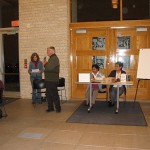If you watch golf on Sunday afternoons you may have seen a man wearing a multi-colored wig holding a sign saying John 3-17. That is the last verse of today’s gospel ;’’For God so loved the world that he gave his only begotten son, so that everyone who believes in him may not perish but may have eternal life. Indeed God did not send his son into the world to condemn the world, but that in order that the world might be saved through him.’
In the second reading St. Paul expresses this wonderful loving act of God from Christ’s reality. Christ did not consider being equal to God as something to be exploited or clung to. He emptied himself of divinity and took on humanity, being like us in everything except sin. In obedience to his Father’s will to tell all who would listen about how God loves and treasures each of us he preached God’s love and mercy so strongly that the powers that be, out of concern for their own position and power in society had the Roman authorities put him to death by crucifixion.
But Christ’s death was swallowed up in the victory of the resurrection. ‘God highly exalted him- through his resurrection -and gave him a name that is above every other name so that at the name of Jesus every knee should been in heaven and on earth and under the earth and every tongue should confess that Jesus Christ is Lord to the glory of God the Father.’
St. Paul boasted to the Corinthians,’ we preach a crucified Christ, to the Jews a scandal’ they could not accept as Messiah a man executed as a common criminal, and to the intellectual Greeks, total foolish, but to those who believe Christ the power of God and the wisdom of God.’
In the early church the cross was an embarrassment. Crucifixion was the most cruel, most humiliating form of execution. The earliest form of Christian identification was the fish. In Greek the phrase ‘Jesus Christ, Son of God Savior’ was constantly used in the early church. The first letter of each of these Greek words spelt ‘fish’ and so the drawing of a fish was often used as an identifying mark of a Christian.
When the church began to use crosses were used they were covered with precious stones. Our present crucifixes and art depicting the physical reality of the horror on Christ’s death developed in church art in the Middle Ages.
On Good Friday our thoughts and prayers center of the physical suffering of Jesus on Calvary, but on this feast of the Exaltation of the Cross we celebrate the cross as the instrument of our salvation. God was in Christ reconciling the world to himself, making peace through the blood of the cross.
That’s why we are here Sunday after Sunday; we have an obligation to thank God for making us His friends, loved sons daughters of God and all came about this through the life giving sufferings, death and resurrection of Jesus. By his wounds we are healed.
Here we offer in thanksgiving the same gift of himself Christ offered on the altar of the cross – as we pray at each Mass – it is truly right and just, our duty and our salvation, always and everywhere to give thanks.
Here we are nourished with the body and blood of the crucified and risen Christ, a nourishment that gives us the strength we need, the conviction we need to say with St. Paul, ’I live now, no longer I but Christ lives in me and the life I live I Iive trusting in the son of God, who loved me and gave his life for me.
From this altar we receive the grace we need to live this Mass outside these walls, in the lives we live, the service we give, the work we do and the prayers we pray. From this altar we receive the openness we need to see in every person we meet a person loved and treasured by God as we are. We continue this Mass giving thanks that God so loved the world, God loved every one of us, He sent his son to us not to condemn us but to embrace us with all our weaknesses and failings, giving us the boldness to call our God – Father.
 Founded by St. Paul of the Cross, every Passionist takes a special vow to spend his or her energies in promoting remembrance of the sufferings of Jesus, the memory of the Cross, and reflection of the meaning of the Cross for the world.
Founded by St. Paul of the Cross, every Passionist takes a special vow to spend his or her energies in promoting remembrance of the sufferings of Jesus, the memory of the Cross, and reflection of the meaning of the Cross for the world.




